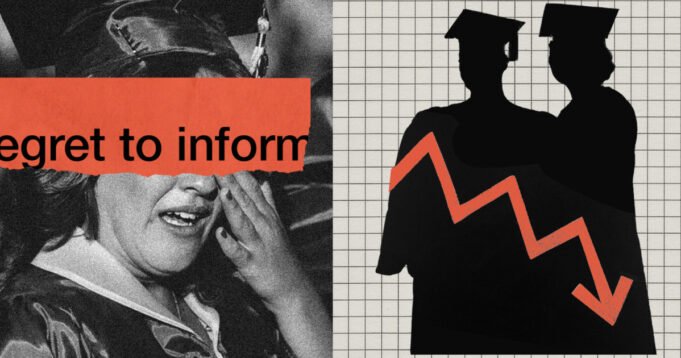Recent graduates looking to enter an increasingly shaky labor market are painting a dire picture of their job search: “A black hole,” one said. “I’m disheartened,” said another. “I almost feel like it wasn’t worth going to school,” said a third.
NBC News asked people who recently finished technical school, college or graduate school how their job application process was going, and in more than 100 responses, the graduates described months spent searching for a job, hundreds of applications and zero responses from employers — even with degrees once thought to be in high demand, like computer science or engineering. Some said they struggled to get an hourly retail position or are making salaries well below what they had been expecting in fields they hadn’t planned to work in.
“It was very frustrating,” said Jensen Kornfeind, who graduated this spring from Temple University with a degree in international trade. “Out of 70-plus job applications, I had three job interviews, and out of those three, I got ghosted from two of them.”
The national economic data backs up their experience. The unemployment rate among recent graduates has been increasing this year to an average of 5.3%, compared to around 4% for the labor force as a whole, making it one of the toughest job markets for recent graduates since 2015, according to an analysis by the Federal Reserve Bank of New York released Friday.
“Recent college graduates are on the margin of the labor market, and so they’re the first to feel when the labor market slows and hiring slows,” said Jaison Abel, an economist at the Federal Reserve Bank of New York.
Across the economy, hiring in recent months has ground to its slowest pace since the start of the pandemic, with employers adding just 73,000 jobs in July, according to data released Friday. The number of longer-term unemployed people who have been out of work for more than 27 weeks increased last month by 179,000 to 1.8 million.
In short, it’s a pretty stable market for those who have a job, but a much more challenging one for those who are trying to get one, economists said.
Driving that trend is hesitation among employers to hire new workers amid wider economic uncertainty in the midst of President Donald Trump’s shifting tariff policies and federal spending cuts, economists have said. Then there is the emergence of AI, which some companies have said they are using to replace certain entry-level jobs, like those in customer support or basic software development.
“This is going to be an environment for recent college grads, as well as many workers, which is going to require more patience, more time and perhaps more diligence as they seek to attain employment,” said Mark Hamrick, a senior economic analyst for Bankrate.
Here is how several recent graduates described their job search:
23
Atlanta
Bachelor’s degree, computer science
Unemployed
Adam Mitchell thought he was doing everything right. He majored in computer science at Georgia State University and interned at State Farm doing web development. He’d been told since he was a teenager that a degree in computer science was a guaranteed path to a high-paying job right out of college.
“I was under the impression that since I’ve got three years of internship experience under my belt, this will be a cakewalk,” Mitchell said. “I was pretty quickly humbled. There’s nothing available.”
More than seven months after graduating, he’s applied for more than 100 jobs and gotten two interviews and only one job offer — for the 4 a.m. shift at Starbucks, which he didn’t take because the hours would make it too hard to pursue other opportunities. Among the jobs that turned him down: an hourly role at Costco and a customer service job in the call center at State Farm.
“The very few openings that there were would be so competitive that you would pretty much get a rejection notice as soon as you apply,” said Mitchell, who’s been living at home with his parents in the Atlanta area and spending down his savings.
“I can’t be doing this forever, just waiting for the dust to settle and things to kind of normalize again — I need a job,” said Mitchell, who worries about paying back his student loans.
Tech workers have been some of the hardest hit in a slowing job market, with more than 400 employers including Meta, Intel and Cisco announcing more than 130,000 jobs cut in 2025, according to tech job site TrueUp.
Those cuts mark a retrenchment after the hiring spree those companies went on after the pandemic, while an abundance of workers are vying for the remaining jobs, said Allison Shrivastava, an economist at Indeed Hiring Lab. Early adoption of AI is also likely driving some of the cuts and leading employers to rethink hiring plans in anticipation of AI’s future role, Shrivastava said. Mitchell worries that could hurt his prospects long term, so he isn’t limiting his search to tech jobs.
“I’m just kind of looking for anything,” he said. “I don’t know if the tech-side economy is ever going to be the same again.”
26
Emporia, Kansas
Associate’s degree, power plant management
Unemployed
After Anthony Young graduated last year from Flint Hills Technical College in Emporia, Kansas, he planned to use the degree to get a job at a nearby nuclear power plant where his wife also works. But after more than a year, he hasn’t succeeded.
“It is essentially a useless degree,” Young said. “I wasted two years of my life, and I can’t do anything with it.”

Looking for work beyond the power plant industry has also been a struggle, as other employers in Emporia, about an hour from Wichita, have been cutting jobs. Tyson closed a meat processing plant there at the start of the year, eliminating over 800 jobs, and the Michelin tire company cut 80 jobs last year, nearly 40% of its workforce. The town had an unemployment rate of 5.8% in June, when not adjusted for seasonal employment, which was the highest in the state, where the overall unemployment rate was 4.1%, according to the state’s Department of Labor.
Young recently went back to school to get a technical certificate to work as a household electrician. But when he started looking for a job, he learned that he would need to go through a five-year apprenticeship program with the local electrical workers union and travel up to two hours away for work, which would be a financial strain because he and his wife only have one car.
“I just have to figure out a way to get a car and make peace with the fact that there’s a chance I may be put somewhere really far from home and I never get to see my family very much for five years, but I don’t know what else to do really,” Young said.
His wife makes more than $90,000 a year — a salary he would have thought would be enough in a small town in Kansas. But not anymore, he said. An apartment that would have cost $600 a month in 2019 is now $1,000. His weekly trip to the grocery store has gone from costing $80 to $180. Then there are his $20,000 in student loans, and the rising cost of insurance, gas and utilities.
“We still live paycheck to paycheck,” he said, “and we shouldn’t be.”
25
Snyder, Texas
Master’s degree, design with a focus on user experience
Eligibility adviser for SNAP and Medicaid benefits
Sabrina Highfield, 25, was making more than $70,000 a year as a project manager and analyst before she returned to school in 2024 in hopes of boosting her salary. But since she graduated in the spring from the University of Texas at Austin with a master’s, the opposite has happened.
After applying to more than 1,000 jobs and getting only two interviews, she’s living back in her hometown of Snyder, Texas, with her grandmother, making $35,000 a year working in an entry-level position helping administer food assistance benefits — something unrelated to her field of study and a job she suspects she got, in part, because the hiring manager knew her grandmother.

“It’s kind of like a black hole out there,” she said on a recent morning when she was babysitting her sister’s two children. “I’ve tailored my resume based on the job posts, I’ve created cover letters for each role as well, based on the company’s values and everything. I would say it’s a little discouraging. I did find a job, though it’s not at all in the industry that I thought I’d be in.”
She hopes to move up to a more senior position with her current employer, Texas Health and Human Services, but so far she’s had no luck.
It’s a vastly different job market than several years ago, which she doesn’t think the recent economic data is capturing.
“Things look good on the surface, I guess, but when you dig a little deeper, it’s concerning for Gen Z,” she said.
22
Miami
Bachelor’s degree, operations and information management
Unemployed, starting his own business

After applying to hundreds of positions, working his friend and family connections and reaching out to his school’s alumni network, Oliver Dolabany has landed just one interview and zero job offers over the past six months. Like most of his classmates, he’s back home living with his parents.
Getting a job feels more like luck than anything having to do with his major or academic qualifications. When a job is posted on LinkedIn, he said he can see it has received more than 100 resumes in the first hour. The one interview he got came through an alumni connection who knew the CEO of the company and put in a good word. But even then, he didn’t get the position.
“It’s not necessarily even like being more qualified than the guy next to you,” he said. “It’s like just getting luckier than the guy next to you.”
While at the University of Massachusetts, Amherst, Dolabany worked as a teaching assistant, overseeing 500 students a semester, got A’s in nearly all of his classes, and chose a major — operations and information management — that he believed would set him up for success.
“It was kind of presented to me as, this is the major that every company needs, every company wants,” Dolbany said. “It was presented as, you’re pretty safe compared to all the other majors at the school.”
He plans to launch a skin care business with a friend while applying for jobs and living with his parents. He still hopes to find a job in New York City and move into a place of his own.
22
Durham, North Carolina
Bachelor’s degree, health education
Clinical researcher
Jaylah Dorman landed a job doing clinical research at a private physician’s practice in her hometown of Durham, North Carolina, shortly after graduating from Howard University — a success she attributes to her strong professional network and her degree in a high-demand field.
Hiring in the health care sector has been driving much of the job growth nationally, with around half of the 2.2 million jobs added to the economy last year in health care-related sectors, according to an analysis by S&P Global.

Still, she has a negative view of the job market overall and has seen a lot of her peers go to graduate school rather than head straight into the workforce.
“A lot of adults have confirmed that this is one of the worst times to come out of college,” she said. “I think that is the narrative that is being confirmed by people who’ve been in the job market.”
Dorman, who hopes to go to medical school, is also concerned about the sweeping tax cut and spending bill passed by Congress in July, which will cap how much students can borrow for graduate and professional programs.
The Trump administration has also been cutting research spending and public health jobs. Dorman had considered trying to get a job at the Centers for Disease Control and Prevention, but ruled that out as the administration started firing workers.
26
Summit, Illinois
Bachelor’s degree, education
Elementary school teacher
Saida Lopez-Rosales considers herself one of the lucky ones. She was able to get an elementary school teaching job in a suburb of Chicago after graduating in June when a position suddenly opened up at the school where she was student teaching. But she said she’s seen her classmates at National Louis University in Chicago struggle despite a national shortage of teachers.
Last year, there were more than 400,000 teaching jobs that went unfilled or were filled by teachers not fully certified for their position, according to the Learning Policy Institute. But that shortage can vary by school district and teaching discipline. There are also indications that shortages are easing in Illinois, where Lopez-Rosales and her classmates have been looking.

Lopez-Rosales is expecting the local teaching job market to get increasingly competitive after Chicago Public Schools announced in July it was laying off around 1,400 employees, including around 400 teachers.
“When I was in school, everyone was like, ‘You’ll get a job right after graduation, you’ll get a job.’ That’s how they were selling it,” said Lopez-Rosales, who decided to go into education because she had heard there was a teacher shortage. “Luckily, that’s how I got it, but I have a friend who’s still looking.”
Lopez-Rosales isn’t particularly optimistic about the economy or her financial outlook. She will be making $55,000 — a higher salary than other teaching positions she’d looked at. But with rent in the area costing well over $1,000 a month, she won’t be able to afford to move out of her parents’ house.
“It’s more like a paycheck-to-paycheck kind of thing, because you do have to pay bills and feed yourself,” Lopez-Rosales said.
While she said she’s content living with her parents, it isn’t what she envisioned for herself in her mid-20s.
“I told myself, by 26, I’d have my own house, I’d have my own family, I’d have my nice little luxury car. That hasn’t happened,” Lopez-Rosales said. “At first, I did kind of beat myself up for it, but it’s like the world’s changing. Everything’s changing. Everything I feel like is a little bit harder. So now it’s OK.”









